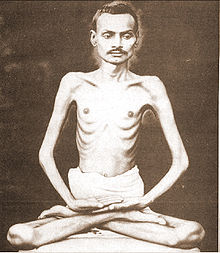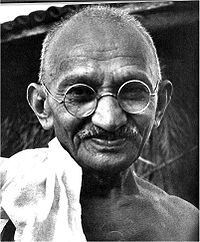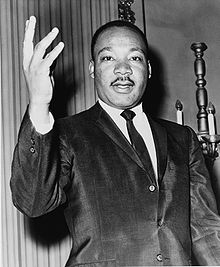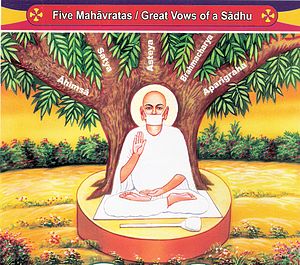The American Civil Rights movement during the mid 1950’s to early 70’s marked one of the most tumultuous periods of social change and unrest in American history. A wave of political and social conservatism consumed the national attention during the 1950’s after the end of World War II and now with the African-American Civil Rights Movement in full swing, the fires of change swept through American culture.
So how could Jains, who are hardly known of outside of academia in the United States at this time, have any influence on social movements in America?
As with many events in our lives, it isn’t the impact that reaches you, but the ripple.
Meet our impact point. Shrimad Rajchandra
 Shrimad Rajchandra was a Jain philosopher who lived in India between 1867 and 1901. After watching a funeral pyre at a young age, it is said that Shrimad Rajchandra suddenly recollected all of his past lives, thus gleaning all the knowledge and spiritual wisdom he attain in those periods. He would go on to spend the rest of his life teaching and writing about spiritual concepts within the Jain framework until he died at the age of 32. His most important literary work, which bears his name, is highly regarded even today.
Shrimad Rajchandra was a Jain philosopher who lived in India between 1867 and 1901. After watching a funeral pyre at a young age, it is said that Shrimad Rajchandra suddenly recollected all of his past lives, thus gleaning all the knowledge and spiritual wisdom he attain in those periods. He would go on to spend the rest of his life teaching and writing about spiritual concepts within the Jain framework until he died at the age of 32. His most important literary work, which bears his name, is highly regarded even today.
What is interesting about his story (among other things) is that Shrimad Rajchandra made a very special friendship with one of history’s most endeared activists. Mahatma Gandhi. Gandhi himself regarded Shrimad Rajchandra as not only a friend, but a spiritual guide.
“I have drunk to my heart’s content the nectar of religion that was offered to me by Shri Raichandbhai. Raichandbhai hated the spread of irreligion in the name of religion and he condemned lies, hypocrisy and such other vices which were getting a free hand in his time. He considered the whole world as his relative and his sympathy extended to all living beings of all ages.” –Mahatma Gandhi
 Mahatma Gandhi is who many of us think of regarding civil disobedience and non-violent resistance. Under the influence of his native Hindu faith, his mentor Shrimad Rajchandra who preached ahimsa (non-injury), and a love for freedom, Gandhi began civil rights and liberation movements in South Africa during his early years as an attorney before moving on to his native India. Gandhi is known for his non-violent resistance against British rule in India which after years of struggle, led to its independence in 1947. He was assassinated in 1948.
Mahatma Gandhi is who many of us think of regarding civil disobedience and non-violent resistance. Under the influence of his native Hindu faith, his mentor Shrimad Rajchandra who preached ahimsa (non-injury), and a love for freedom, Gandhi began civil rights and liberation movements in South Africa during his early years as an attorney before moving on to his native India. Gandhi is known for his non-violent resistance against British rule in India which after years of struggle, led to its independence in 1947. He was assassinated in 1948.
“The science of war leads one to dictatorship, pure and simple. The science of non-violence alone can lead one to pure democracy…Power based on love is thousand times more effective and permanent than power derived from fear of punishment…” –Mahatma Gandhi
From America’s South, its own philosopher and propagator of non-violence and change soon rose. Martin Luther King, Jr., a Baptist preacher from Georgia, was a tremendous personality. An academic marvel with a flare for leadership and activism, he helped found the SCLC (Southern Christian Leadership Conference) and was a prominent leader in the NAACP. King led the Montgomery Bus Boycott of 1955 which opposed the Montgomery Alabama transit segregation policy, and played a pivotal role in the 1963 March on Washington where he delivered his “I Have a Dream” speech.
While King cited many influences for his position on non-violent activism, he spoke warmly of none other than Mahatma Gandhi. King was greatly impacted by Gandhi’s work after visiting India, a trip that may have helped shape the American political and social structure forever.
“Since being in India, I am more convinced than ever before that the method of nonviolent resistance is the most potent weapon available to oppressed people in their struggle for justice and human dignity. In a real sense, Mahatma Gandhi embodied in his life certain universal principles that are inherent in the moral structure of the universe, and these principles are as inescapable as the law of gravitation.” –Martin Luther King, Jr.
With the help of King and many others in the struggle for racial equality, America eventually adopted the Civil Rights Act of 1964, the Voting Rights Act of 1965, the Immigration and National Services Act of 1965, and the Fair Housing Act of 1968 among others. For his service to humanity, King was awarded the Nobel Peace Prize. He was assassinated in 1968.
Ripples. Martin Luther King, Jr. was an American Christian. Gandhi was a Hindu. Shrimad Rajchandra was a Jain philosopher. Lord Mahavira taught his people 2,500 years ago in northern India. Each ripple reached out, inch by inch, and eventually covered the world. And the influence of non-violent activism is still alive today with our current Occupy Movement, which has spread globally.
So now we see how Jainism subtly influenced social change across centuries and nations without converting a single soul, without coercion, without force, but simply because it makes sense.



